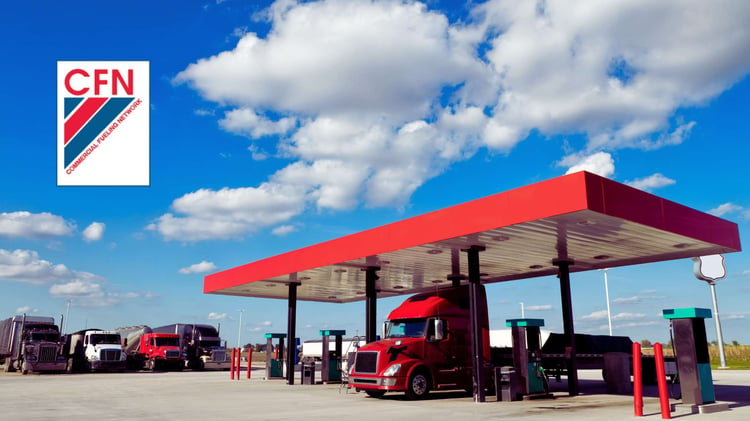
If your business is exploring fuel card options, you've likely come across the Commercial Fueling Network (CFN). For fleets of all sizes, this is one of the most popular fuel card networks to consider as CFN is the largest and most established cardlock fueling network in the United States. With over 3,000 cardlock locations that are specifically designed for commercial use, the CFN network helps companies save money on fuel, control their fuel purchases, and simplify fuel reporting processes through the CFN fuel card.
In this guide, we’ll explain what you need to know about CFN, including how it works, which companies should consider using CFN, and how to choose the best CFN fuel card provider.
Table of Contents
- What is CFN?
- What businesses typically use CFN?
- How does CFN work?
- How do I pick the best CFN card provider?
- Are CFN fuel prices cheaper?
- What fuel card controls does CFN offer?
- What are cardlocks?
- Where can I find CFN cardlocks?
- What are the benefits of cardlocks?
- Can I purchase off road diesel with a CFN card?
- What is CFN Fleetwide?
- How to use a CFN Card
- Can anyone get a CFN card?
- How to get a CFN card
What is CFN?
CFN stands for the Commercial Fueling Network (or the CFN Network) and is one of the largest membership-based fuel programs in the United States. Founded in 1988 to deliver business services and fuel discounts to fleets of all sizes, CFN operates through a network of over 200 independent partners known as CFN card providers. These providers service over 650,000 businesses and over 3.5 million active cardholders across the United States.
The CFN fuel card provides access to discount fuel sites, primarily on the West Coast. At over 3,000 locations, members can purchase fuel at either cost-plus or retail-minus pricing, allowing members to save money on fuel and run their business smoothly.
What Businesses Typically Use CFN?
While any business can take advantage of the CFN Network, it’s most commonly used by trucking companies, distributors, manufacturers, and construction businesses. Companies with trucks benefit from CFN sites because they're built for larger vehicles, and construction firms often take advantage of the availability of dyed diesel at CFN sites for off-road equipment because the fuel product is exempt of road taxes. However, any business with monthly fuel expenses over $1,000 should consider a CFN fuel card to pay for vehicle fueling. Here are some types of businesses that typically use CFN:
- Trucking
- Distributors
- Manufacturers
- Construction
- Landscaping
- Oil & gas
- Plumbing
- Medical transport
- Delivery
- Car dealerships
- Towing
How Does CFN Work?
The Commercial Fueling Network is a partnership between the CFN network and CFN card providers. CFN maintains the network infrastructure and processes transactions between card issuers and merchant sites. CFN card providers offer the CFN card to their clients and manage customer support, billing, purchase controls, and comprehensive reporting.
This structure is similar to traditional credit card networks, where major providers like Visa and Mastercard establish relationships with merchants to ensure widespread acceptance, and financial institutions issue branded cards with added features or incentives. This extends service reach and gives customers more options.
How do I Pick the Best CFN Card Provider?
Since CFN card issuers offer access to the same locations, you should consider each CFN card provider's level of customer service, pricing structures, associated fees, and the robustness of their card management platform before signing up. An easy place to start is to look for third-party reviews of the CFN card provider that you're considering so that you can see what customers are experiencing.
While it may seem convenient to select a local CFN provider, always verify service quality through customer reviews. Some local providers have limited resources for fuel card management, as their primary focus is operating fuel sites rather than providing account support to customers.
To find CFN card issuer reviews, go to independent review sites like Trustpilot and search for the company name. For example, P-Fleet is a CFN card provider, and you can see how our customers rate us 4.8 stars out of 5 stars on Trustpilot.
Are CFN Fuel Prices Cheaper?
The CFN network enables customers to receive cost-plus fuel card pricing at cardlock locations. These wholesale prices are often lower by several cents per gallon than the average retail prices of nearby gas stations and truck stops. Customers fueling in markets with elevated fuel prices often see the largest savings because of a wider gap between wholesale and retail pump prices.
As the basis for the cost of fuel at CFN stations, the CFN Network utilizes Oil Price Information Service (OPIS) which reports the wholesale rack price for regions across the country. CFN fuel card providers then charge a margin above the OPIS cost, along with the applicable state and federal fuel taxes that need to be included in the final customer price.
Check out the CFN Fuel Prices Quarterly Report to see how much fleets can save at CFN sites compared to retail prices by city and state.
What Fuel Card Controls Does CFN Offer?
With CFN, businesses gain access to industry-leading purchase controls, which are important for managing company fuel expenses and controlling driver purchases. Key features that distinguish CFN from other fuel cards include gallon limits and product controls.
Unlike most fuel cards that set dollar-based limits, CFN uses gallon limits. This approach ensures that limits remain tied to your vehicle’s tank capacity, regardless of fuel price fluctuations, so drivers can fully refuel without management needing to adjust spending limits every time fuel costs change.
Product controls allow you to restrict fuel card usage by fuel type, ensuring drivers can only purchase approved products. For example, you can set diesel-only permissions so that pumps at CFN cardlock stations only authorize diesel purchases for your diesel vehicles. It’s important to note that product controls are enforced solely at CFN cardlock sites, where the CFN network requires point-of-sale (POS) systems to support these controls. Retail gas stations and truck stops do not have POS configurations enabled for product restrictions, which is a key reason why most other fuel cards do not offer product control features. When CFN cards are used at retail locations without product enforcement, you can implement exception alerts that notify you by email if a non-authorized product is purchased.
In addition to gallon limits and product controls, CFN offers several other fuel card controls, including:
- PIN required for purchases
- Driver prompt to enter odometer
- Fuel-only purchase restrictions
- Product type controls
- Daily transaction count limits
- Gallon limits per transaction
- Authorized fueling times and days
- Retail access enabled or locked
- Product exception alerts
- Transaction error alerts
- Transaction alerts for specific cards
What are Cardlocks?
A cardlock is a specialized fueling site within the Commercial Fueling Network that operates without on-site attendants and is meant to meet the operational needs of commercial fleets. A cardlock fuel program provides drivers with a fuel card that allows them to access fuel at these locations.
Most cardlock locations have features designed to accommodate larger vehicles and equipment, including larger fuel islands, high-capacity pumps, specialty fuels like DEF or dyed diesel, and 24/7 access. Unlike conventional gas stations, cardlocks normally do not service the general public, which reduces wait times and congestion, making fueling more efficient for fleets and businesses.
Where can I Find CFN Cardlocks?
While there are CFN sites across the U.S., the majority are located in Arizona, California, Idaho, Nevada, Oregon, Utah and Washington. In these seven western states, the number of CFN cardlock stations far surpasses that of traditional truck stops:
| State | CFN Stations | Truck Stops |
| Arizona | 51 | 50 |
| California | 536 | 116 |
| Idaho | 118 | 64 |
| Nevada | 62 | 27 |
| Oregon | 123 | 33 |
| Utah | 47 | 73 |
| Washington | 205 | 37 |
| Total | 1142 | 400 |
There are nearly three times as many cardlock sites, which highlights CFN’s extensive coverage and accessibility for fleets operating in the region. This concentrated presence is largely due to the Commercial Fueling Network’s focus on developing fuel sites in major metropolitan areas and along primary commercial corridors where truck stop availability is limited.
For businesses with routes spanning the West Coast, CFN offers greater convenience and more fueling opportunities compared to traditional options. To find specific locations, utilize our CFN site locator to view all available cardlock stations by state.
What are the Benefits of CFN Cardlocks?
In addition to providing extensive coverage throughout the West Coast and delivering significant per-gallon savings, there are many benefits of CFN cardlocks. Here are a few key reasons why commercial business fleets utilize cardlocks:
- Built to accommodate large commercial vehicles and featuring high overhead clearance and wide turning space to make entry and exit easy for drivers
- Less traffic and waiting time than typical gas stations and truck stops, resulting in quicker access to fuel pumps and greater efficiency
- Equipped with high-flow diesel pumps designed to rapidly fill large vehicle tanks, minimizing fueling time and helping drivers resume routes without delay
- Access to specialty fuel products such as DEF and off-road diesel directly at the pump
Can I Purchase Off Road Diesel with a CFN Card?
Yes, with a CFN card you can purchase off road or dyed diesel for equipment and vehicles used in non-highway operations. This type of fuel is exempt from road taxes because it is strictly intended for use in off-road machinery, generators, or refrigerated trailers. Traditional gas stations typically do not offer dyed diesel because it's mostly used for commercial purposes rather than by the general public. You can check this list of CFN dyed diesel sites by city and state to find dyed diesel in your area.
What is CFN Fleetwide?
CFN Fleetwide refers to the expanded CFN fuel card program, which provides access to both the core network of 3,000 discounted cardlock locations and more than 65,000 additional gas stations and truck stops nationwide. This nationwide access includes major brands such as Pilot, Love’s, Chevron, Exxon, Mobil, Circle K, Speedway, Texaco, Sinclair, and many others, ensuring that drivers have reliable fueling options throughout the United States.
How to Use a CFN Card
Using a CFN fuel card at a CFN cardlock station is straightforward and similar to using any other card payment. However, instead of having a card reader at every pump, many CFN cardlock stations feature a few centralized card readers near the fuel islands. These readers activate any pump on the premises.
To begin fueling, follow these basic steps:
- Swipe your CFN card at the pump or card reader (and enter the pump number).
- Enter the card PIN or your driver ID that has been assigned.
- Enter the vehicle odometer reading, if required.
- Begin fueling the vehicle.
Can Anyone Get a CFN Card?
To apply for a CFN fuel card, applicants must be a business owner or an independent contractor. CFN cards are generally not intended for personal or individual use, as the program is specifically designed to accommodate the fueling needs of commercial fleets and businesses.
How to Get a CFN Card
Getting a CFN card for your business is a straightforward process that can be completed in just a few minutes. Here are the steps for getting a CFN fuel card:
- Complete the CFN fuel card application online.
- You'll be assigned an account representative.
- Once approved, review the terms and set up your payment information.
- Place your order for CFN fuel cards.
For more information, refer to our complete guide to the CFN fuel card application process.






